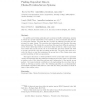Free Online Productivity Tools
i2Speak
i2Symbol
i2OCR
iTex2Img
iWeb2Print
iWeb2Shot
i2Type
iPdf2Split
iPdf2Merge
i2Bopomofo
i2Arabic
i2Style
i2Image
i2PDF
iLatex2Rtf
Sci2ools
112
click to vote
MOBICOM
2000
ACM
2000
ACM
Pushing dependent data in clients-providers-servers systems
In satellite and wireless networks and in advanced traffic information systems in which the up-link bandwidth is very limited, a server broadcasts data files in a round-robin manner. The data files are provided by different providers and are accessed by many clients. The providers are independent and therefore files may share information. The clients who access these files may have different patterns of access. Some clients may wish to access more than one file at a time in any order, some clients may access one file out of of several files, and some clients may wish to access a second file only after accessing another file. The goal of the server is to order the files in a way that minimizes the access time of the clients given some a-priori knowledge of their access patterns. This paper introduces a clients-providers-servers model that better represents certain environments than the traditional clients-servers model. Then, we show that a random order of the data files p...
Related Content
| Added | 01 Aug 2010 |
| Updated | 01 Aug 2010 |
| Type | Conference |
| Year | 2000 |
| Where | MOBICOM |
| Authors | Amotz Bar-Noy, Joseph Naor, Baruch Schieber |
Comments (0)

